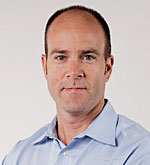sierraclub.org - sierra magazine - sept/oct 2012 - common ground
COMMON GROUND
America's most endangered habitat
By Michael Brune
 Photo by Lori Eanes
Photo by Lori Eanes
This spring I found myself at the White House Correspondents' Dinner—
a slightly bizarre gathering of celebrities, reporters, politicos, and the occasional do-gooder like me. One of the more refreshing aspects of the event was a series of conversations I had with Republican leaders who talked (off the record) about their interest in tackling climate change—and the political constraints preventing them or their colleagues from speaking out about it.
"Mike, we may not agree on much," one prominent Republican said. "But on climate change, there's not really that much separating us." Then he added, "But there's no way I can say that publicly."
How did we get to this place? Instead of working together to solve problems, our two major political parties are engaged in a perpetual tug-of-war. That's a tough environment for the Sierra Club, which has a long history of alliances across the ideological spectrum based on shared values about conservation and public health. Even though the Club is usually labeled as a liberal organization, our mission to promote the "responsible use of the earth's ecosystems and resources" sounds downright conservative to me. Most people, regardless of their political leanings, agree that protecting the planet is the right thing to do, even if they don't always agree on how to do it.
When we can bring citizens together around environmental values, change will come.
I'm writing this at the height of the election season—the most partisan time in hyperpartisan America. But the Sierra Club's political program has just one objective: to help elect good people of any party who will work to keep our air and water clean, stabilize our climate, and protect the key ecological regions we treasure. No party has a monopoly on environmental values; after all, many of the landmark environmental laws that Republican legislators now attack were passed by large bipartisan majorities and signed into law by President Richard Nixon.
 Illustration by Keith Negley
Illustration by Keith Negley
I'm optimistic that support for a clean environment can once again be bipartisan—not because of anything I've seen in Washington, D.C., but because I keep meeting people of every political stripe who share the values of justice and responsibility that are at the heart of the Club's work. When we can bring citizens together around these values, change will come from the ground up.
The Sierra Club has a head start here because, with 1.4 million members and supporters, we already represent a wide array of opinions and priorities. And as a (lowercase d) democratic, volunteer-run organization, we have 120 years of experience with reaching consensus. Here's one thing we've learned: Real dialogue starts with people, not parties.
I love the Living Room Conversations project started by MoveOn.org founder Joan Blades, in which one self-identified "conservative" and one self-identified "progressive" each invite two friends of similar political ideologies to join a structured conversation. Their goal is to learn about and from each other while discussing an issue of their choice. On one of the Sierra Club's issues—energy—participants agreed across party lines on solutions like conserving energy and growing our renewable-energy industries.
Those solutions are ready to be adopted. According to the Union of Concerned Scientists, for example, a national renewable-electricity standard that ensured that utilities obtained at least 25 percent of their power from wind, solar, and bioenergy by 2025 would create 297,000 new jobs, $13.5 billion in income to rural landowners, and $15.3 billion in new local tax revenues. It's a win-win-win solution, with nothing partisan about it.
So, candidates: The Sierra Club would love to be evaluating which of you would implement popular solutions like this the most quickly. You just need to come out and say so publicly.
Michael Brune is the executive director of the Sierra Club. You can e-mail him at michael.brune@sierraclub.org and follow him on Twitter and Facebook.